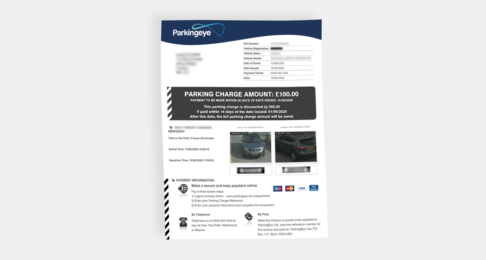Last Updated: 22nd May 2025
Fines and parking charges aren’t a pleasant thing for any motorist to deal with. Sadly, there is a lot of misinformation out there about Parking Charges and whether you need to pay them, which creates additional confusion.
Not knowing exactly where you stand when it comes to a Parking Charge can lead to major problems. We’re going to cover some of the myths around Parking Charges to help dispel some of the rumours and provide clarity on what motorists should do. Much of the confusion around Parking Charges comes from the fact that there is a very similar sounding charge called a Penalty Charge.
Penalty Charge Notice Vs Parking Charge
A Penalty Charge Notice is a charge issued by either the police or the local council when you have parked illegally on public land. A Parking Charge is issued by a private company when you have been deemed in breach of contract for parking on private land (Such as office, supermarket or business car parks).
By parking on private land, you are agreeing to abide by the rules of the car park, which must be displayed clearly on signage.
Do I have to pay a Parking Charge?
You must either pay or appeal a Parking Charge – if you receive a Parking Charge, you have deemed to be in breach of contract for parking on private land. It is your responsibility to pay the fine, or submit a valid appeal as to why you are not at fault.
There has been a common misconception for years that because a Parking Charge isn’t issued by a council or ‘an official’ that it can be ignored, as it’s seen as an invoice instead of a parking fine.
While a Parking Charge and a Penalty Charge Notice can differ, they’re both used to enforce parking rules in place on a site. They both serve as a deterrent against poor parking behaviours and should be taken seriously.
If you’ve been issued a Parking Charge you have a couple of options.
- If your Parking Charge has been issued because you’ve violated a parking rule in place on a site, such as a private car park or NHS site, then you can pay. If you choose to pay your Parking Charge, doing so earlier often means there’s a reduced charge.
- If you’ve been issued a Parking Charge and you think this has been issued by mistake or there were extenuating circumstances, you can appeal.
If you decide to appeal you have 28 days to do so, however, it’s important to note that when you do appeal this timer stops, giving you time to escalate your appeal to POPLA should you want to within that period.
You can find out more about what to do when you receive a Parking Charge here.
Can I be taken to court for not paying a Parking Charge?
You can be taken to court for not paying a Parking Charge, and there is plenty of precedent for companies taking motorists to court for unpaid charges. Ignoring a Parking Charge doesn’t mean it goes away. In fact, ignoring it can make the situation worse.
There have been cases where judges have voted unanimously in favour of the parking management companies. For instance, the case of Parkingeye vs Mr Barry Beavis, the judges determined that the charge ‘was neither improper in its purpose nor manifestly excessive in amount’. The courts upheld the parking charge that was in place and rejected a later appeal.
The misinformation around Parking Charges has meant that parking management companies have taken an increasing number of people to court for not paying.
What happens if I don’t pay parking tickets?
Parking Charges cannot be ignored, even if you refuse to pay and want to appeal you must interact with them. At its simplest level, avoiding a Parking Charge means you miss out on the cheaper payment cost. At its most serious, it can see you being sent additional reminders before finally being taken to court.
That alone can be stressful, and you need to consider the costs of legal fees in many cases. This can often cost you more than the Parking Charge would, which is why payment or appeal are the best two routes to pursue.
Does a Parking Charge only impact the owner of the car?
Not necessarily. In the first instance, the Parking Charge is sent to the registered vehicle owner. However, they can appeal on the grounds they were not responsible for the vehicle at the time.
They can choose to provide the driver’s details as part of their appeal; this then transfers the Parking Charge from the registered vehicle owner to them. This is what is known as a transfer of liability. The parking management company can then pursue the driver for the parking charge as opposed to the registered vehicle owner.
Hopefully, we’ve helped clear up some of the misunderstandings and misconceptions around Parking Charges.
Remember, if you receive a Parking Charge, decide quickly if you’d like to appeal, which you can learn more about how to appeal a Parking Charge here. Alternatively, if you’re looking for quick and low-cost settlement, you can do so here.
Can I get a parking ticket whilst sitting in my car?
Yes, you can. It is irrelevant whether or not you are in the car – if your vehicle overstays or breaks the rules of the car park, you can be issued a Parking Charge. Often car parks offer grace periods to allow time to park before or after buying a ticket, but you cannot circumvent the rules by remaining in your car.


